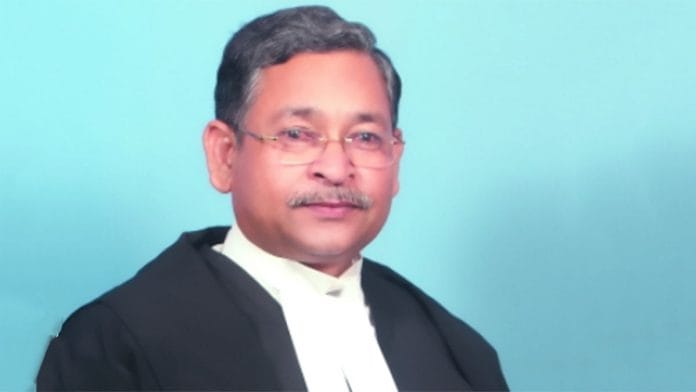New Delhi: It has been over two years since then-Chief Justice of India (CJI) Dipak Misra recommended the impeachment of Allahabad High Court judge Shri Narayan Shukla on charges of misconduct and judicial impropriety, after an in-house committee of judges found “sufficient substance” in allegations against him.
But now, Justice Shukla is set to retire in normal course on 17 July, earning the dubious distinction of not being assigned any judicial work for nearly two and a half years, the longest such period.
This is because the Narendra Modi government did not bring in an impeachment motion against him, and is unlikely to do so in the next couple of weeks before his retirement.
Sources in the higher judiciary told ThePrint that at least two previous CJIs attempted to prod the Modi government into initiating the impeachment process, but the government didn’t respond. ThePrint has also accessed CJI Misra’s letters to the President and the Prime Minister on the issue, which the government didn’t react to.
ThePrint reached Union Law Minister Ravi Shankar Prasad for a comment via phone calls but there was no response until the time of publishing this report.
Also read: Don’t just question police for custodial killings of Jayaraj-Bennix. Courts also responsible
The committee report
The committee probing Justice Shukla — currently the fourth most senior judge at the Allahabad High Court — comprised Justice Indira Banerjee, then-chief justice of the Madras High Court and now a Supreme Court judge; Justice S.K. Agnihotri, then-chief justice of Sikkim High Court; and Justice P.K. Jaiswal, judge of the Madhya Pradesh High Court.
The committee’s report, dated 20 January 2018, concluded that “the aberrations complained of are senior enough to call for initiation of proceedings for his removal (as a judge)”.
Appointed judge of the Allahabad High Court on 5 October 2005, Justice Shukla had attracted controversy after Uttar Pradesh advocate general Raghvendra Singh and one Dr Abhai Krishna, in September 2017, submitted complaints levelling serious allegations against him, to the then-chief justice of the court, Justice D.B. Bhosale.
Among other things, the judge was accused of showing “needless interest” in two important pending matters — GCRG Medical College versus Union of India, and one filed by Dr Nishith Rai, vice-chancellor of Dr Shakuntala Misra Rehabilitation University (for the differently-abled), who had been removed from his post over “serious charges of corruption and for making illegal appointments”.
While Justice Shukla denied any wrongdoing, the in-house committee found merit in the complaints and recommended action against him.
In the GCRG Medical College versus Union of India case, a Supreme Court bench comprising CJI Misra and Justices A.M. Khanwilkar and D.Y. Chandrachud had taken serious note of the action of the Division Bench of the Allahabad High Court headed by Justice Shukla, in going out of its way to give relief to the management of the medical college that had been debarred by the Medical Council of India (MCI).
Justice Shukla had also made unilateral changes to an order passed by the bench headed by him, in his own handwriting, without even bothering to consult the other judge on the bench.
Also read: SC collegium willing, this Karnataka judge could become first woman Chief Justice of India
Refused to resign
After receiving the in-house committee’s report, CJI Misra wrote to Justice Shukla on 21 January 2018, informing him about his decision to accept the committee’s report and write to the President for initiation of the process to impeach him.
Misra also advised Shukla to “resign from your office or seek voluntary retirement”, adding that in case he chose to do neither, he would ask the Allahabad High Court chief justice to withdraw judicial work from him.
Shukla replied within hours of the CJI writing to him, expressing his “unwillingness to resign or seek voluntary retirement”.
The next day, 22 January, CJI Misra wrote to the Allahabad High Court chief justice, informing him about the developments, and advising him against allotting any judicial work to Justice Shukla. The high court CJ wrote back to the CJI the same day, informing him that work had been withdrawn from Shukla.
According to sources in the Supreme Court, Shukla wrote to then-CJI Ranjan Gogoi in May last year, asking to be allowed to discharge judicial duties, since he was “sitting idle without work since more than one year”.
Also read: What happens when corruption scandals hit the Supreme Court? Nothing







What are the reasons that the BJP government or any government for that matter didn’t take action.
1. Corruption is present in every government and no one is an angel.
2. The government does not want to upset the appkcart of the cosy relationship between judges and governments in power.
3. The ruling party always has its hand in every piece of wrongdoing and does not want investigations to happen.
Period.